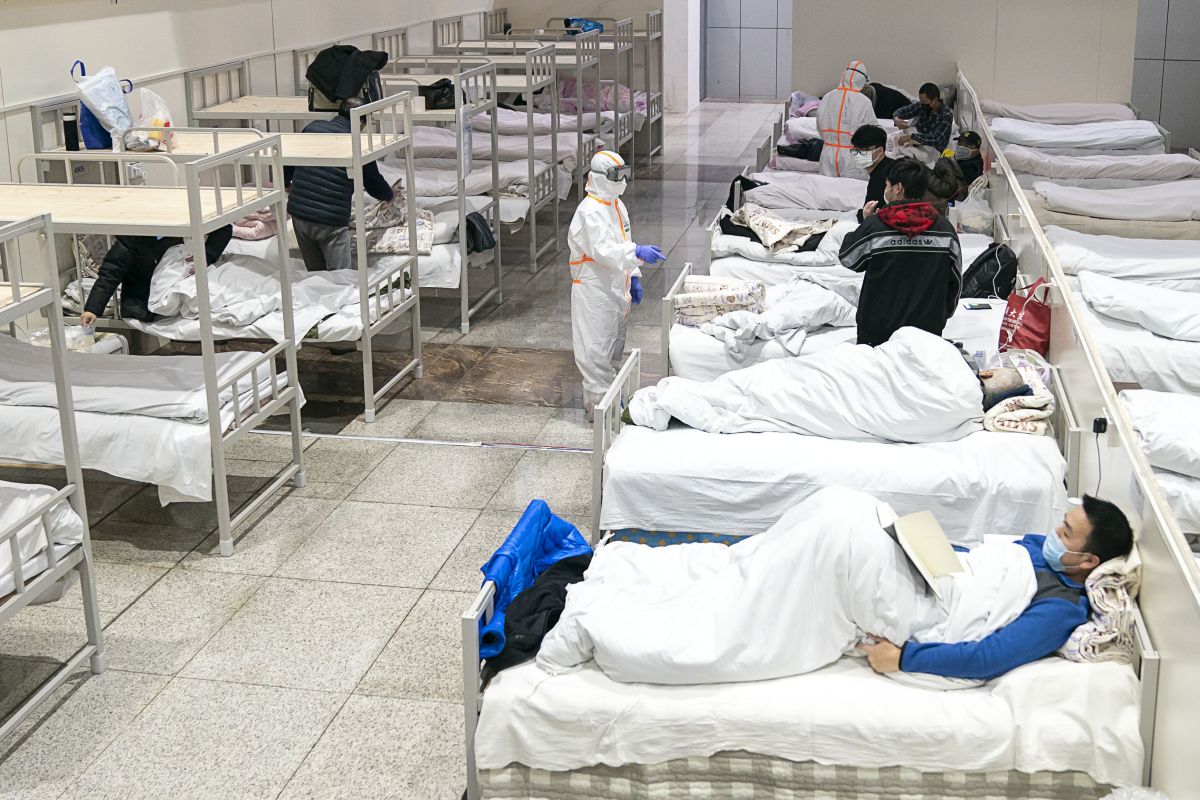Still unexplained
The hunt for the origins of Covid-19 has for the past four years been a tangled web of politics, power struggles, and international finger-pointing.
More than 66,000 people have now been infected in China from the virus that emerged in central Hubei province in December before spreading across the country a month later and causing global panic.

Patients infected with the novel Coronavirus are seen at a makeshift hospital converted from an exhibition center in Wuhan, central China's Hubei Province (Photo: IANS)
The death toll from China’s novel Coronavirus epidemic jumped past 1,500 on Saturday but new infections fell following a mid-week surge caused by a change in the way cases are counted.
More than 66,000 people have now been infected in China from the virus that emerged in central Hubei province in December before spreading across the country a month later and causing global panic.
The overall death toll in China due to the deadly Coronavirus on Saturday increased to 1,523, with a total of 66,492 confirmed cases, authorities said.
Advertisement
The National Health Commission said that it had received reports of 2,641 new confirmed cases and 143 deaths on Friday from 31 provincial-level regions and the Xinjiang Production and Construction Corps.
The number, however, was almost half those reported the previous day.
Among the deaths, 139 were in Hubei province, two in Henan, and one each in Beijing and Chongqing, according to the Commission. Also on Friday, 849 patients became seriously ill.
The Commission added that 11,053 patients remained in severe condition, and 8,969 people were suspected of being infected with the virus.
Some 1,700 medical workers have been infected, with six dying from the COVID-19 illness, officials said, underscoring the country’s struggle to contain the deepening health crisis.
The scale of the epidemic swelled this week after authorities in Hubei changed their criteria for counting cases, adding thousands of new patients to their tally.
The revision added nearly 15,000 patients to Hubei’s tally on Thursday, with the World Health Organization noting that cases going back weeks were retroactively counted.
Chinese President Xi Jinping acknowledged that the outbreak exposed “shortcomings” in the country’s health emergency response system.
Battling the outbreak is a “big test for the country’s governance system and governance ability,” Xi said as he chaired a political meeting on government reforms this week.
Chinese authorities have placed some 56 million people in Hubei under quarantine, virtually sealing off the province from the rest of the country in an unprecedented effort to contain the virus.
Meanwhile, Beijing’s municipal government enacted a rule on Friday requiring all people coming to the capital to quarantine themselves for 14 days, warning that violators would be punished in the latest attempt to contain the deadly COVID-19 illness.
Residents were told to “self-quarantine or go to designated venues to quarantine” after returning to the Chinese capital from holidays.
The measure came as Egypt confirmed the country’s first Coronavirus case, which is also the first in the African continent.
Several countries have banned arrivals from China and major airlines have cut services with the country.
However, the epidemic has continued to spread across China and nearly 500 cases have emerged in more than two dozen countries.
In Singapore, which has 67 confirmed cases, the Roman Catholic Church said it was suspending all masses indefinitely to help prevent the spread of the virus and urged the faithful to follow services on YouTube or the radio.
As of Friday, the number of reported cases outside of China were Japan (203), Hong Kong (56), Singapore (67), Thailand (33), South Korea (28), Taiwan (18), Malaysia (18), Germany (16), Vietnam (16), Australia (15), the US (14), France (11), Macau (10), the UK (nine), the UAE (eight), Canada (seven), India (three), the Philippines (three), Italy (three), Russia (two), Spain (two), Cambodia (one), Finland (one), Nepal (one), Sri Lanka (one), Sweden (one) and Belgium (one), according to the European Centre for Disease Prevention and Control.
Outside China, there has been three deaths — Hong Kong, the Philippines and Japan.
WHO, which has declared the Coronavirus outbreak as a global health emergency, has stated that it poses a “very grave threat for the rest of the world” and should be viewed as “Public Enemy Number 1”.
The novel Coronavirus outbreak has caused alarm as it has crossed global fatalities in the 2002-03 SARS epidemic.
Over 770 people had died worldwide during the Severe Acute Respiratory Syndrome (SARS) outbreak.
Advertisement